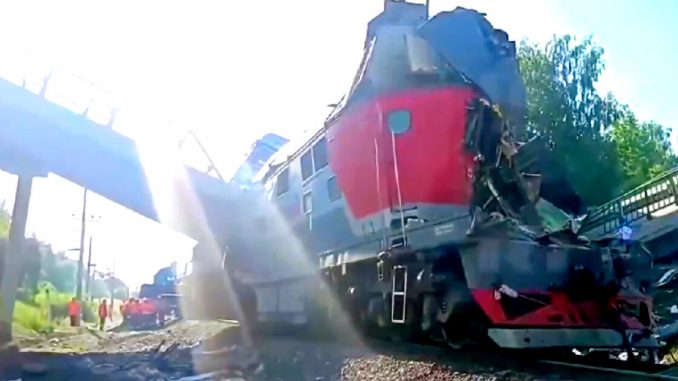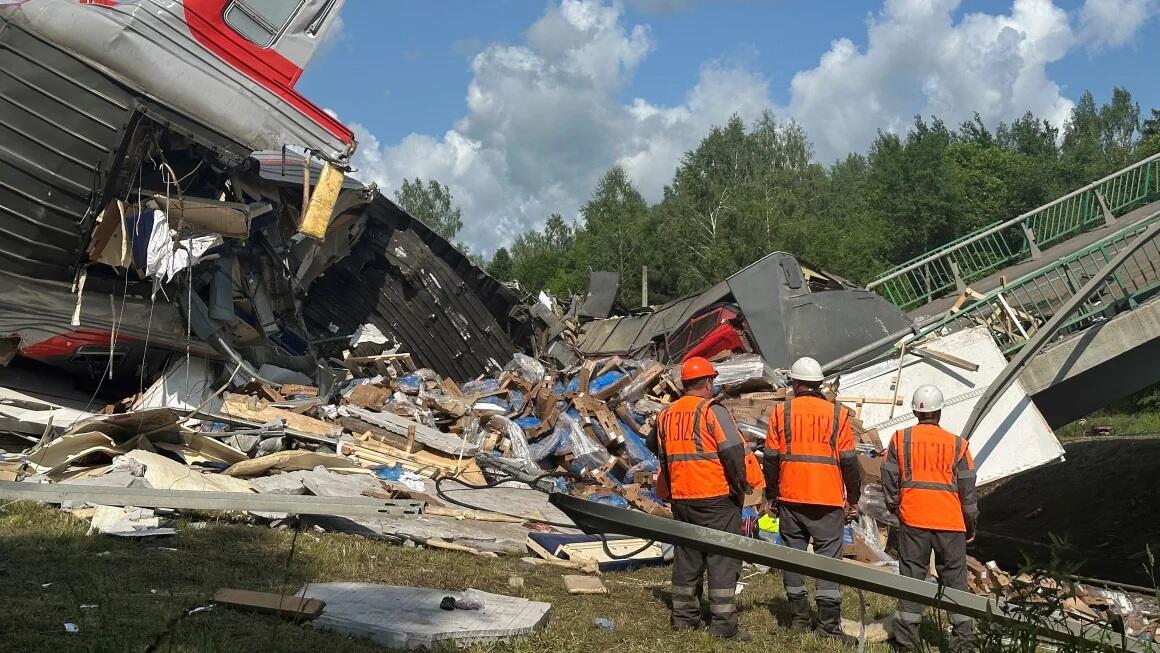
| Published June 2, 2025
Multiple reports confirm a coordinated wave of attacks targeting railway bridges and infrastructure in western Russia near the Ukraine border. These attacks have resulted in significant casualties, infrastructure destruction, and heightened tensions between the two countries.
In recent days, Russia has suffered a series of devastating explosions and sabotage acts on critical railway lines in the Kursk and Bryansk regions, key transit points close to Ukraine. According to The Gateway Pundit, Ukraine has intensified its campaign of disrupting Russian logistics and transportation by targeting these vital railway links.
On June 1, blasts destroyed two major railway bridges in western Russia, causing at least seven deaths and injuring several others, as reported by the Philippine Tribune. The explosions led to the collapse of bridges, which in turn caused train derailments. The Times of India details that the bridge collapses sent multiple train carriages plunging, killing seven people and raising serious concerns about the safety of transport routes in the volatile border area.
Canadian broadcaster CBC News confirmed that derailments have occurred in the Kursk and Bryansk regions, underscoring the increasing sabotage incidents along the Russian-Ukraine frontier. The attacks have crippled key supply lines that Moscow relies on for military and civilian movement, delivering a serious blow to Russia’s operational capacity in the ongoing conflict.
This recent surge in sabotage marks an escalation in Ukraine’s asymmetric warfare strategy. Railway infrastructure, a crucial asset for Russian troop movements and logistics, has become a primary target. Officials in Kyiv have not formally claimed responsibility but have indicated that such tactics are part of their broader resistance efforts.
Russia’s response has been swift, with increased security measures and military patrols in affected areas. Moscow has condemned these attacks as terrorist acts and vowed retaliation against Ukraine. The incidents have also fueled fears of wider destabilization in the region as both sides deepen their conflict.
The railway attacks highlight the vulnerability of infrastructure in modern warfare and the strategic significance of transport networks in contested border zones. As Ukraine appears to double down on sabotage operations, the human and economic toll on Russia continues to mount, complicating prospects for peace in Eastern Europe.

Mystery as Russia is rocked by 3 train crashes in one night after bridges collapse & tracks ‘blown up’ leaving 7 dead https://t.co/7Ud9UqusR4
— Corby Zone (@MissionArtist) June 1, 2025
Implications of the Railway Sabotage in Russia Near Ukraine Border
1. Military and Strategic Impact
The destruction of key railway bridges and resulting train derailments severely disrupts Russian military logistics. Railways are critical for moving troops, weapons, ammunition, and supplies swiftly across vast distances in Russia’s western regions. The sabotage complicates Moscow’s ability to reinforce its forces near the Ukrainian border and maintain supply chains crucial for ongoing military operations.
This disruption may force Russia to reroute supplies through longer, less efficient routes, delaying reinforcements and reducing combat effectiveness. In the broader context of the war, Ukraine’s focus on asymmetric tactics like infrastructure sabotage demonstrates a shift toward targeting Moscow’s operational backbone, weakening Russia without direct frontline engagements.
2. Economic and Civilian Consequences
Railways in these regions are also essential for civilian transportation and commercial trade. The destruction of infrastructure causes delays and increased costs in freight movement, impacting local economies and supply of goods. Train derailments and bridge collapses put civilian lives at risk, as evidenced by the reported deaths and injuries.
Such attacks risk escalating humanitarian issues, including transport shortages and reduced access to resources for communities dependent on these rail networks. The strain on civilian life could increase anti-government sentiment locally or fuel displacement.
3. Escalation of Conflict and Regional Stability
These sabotage acts represent a significant escalation in the ongoing conflict, moving beyond direct battlefield engagements into broader sabotage and possibly terror tactics. Russia’s labeling of the attacks as terrorism could lead to harsher security crackdowns and retaliatory strikes, further inflaming tensions.
The border region could become more militarized and volatile, with increased risks of collateral damage and wider destabilization affecting neighboring countries. The sabotage also signals a hardening stance from Ukraine, indicating that Kyiv may continue to adopt disruptive tactics to counterbalance Russian military advantages.
4. Geopolitical Ramifications
Internationally, these incidents may influence how external actors view the conflict’s trajectory. Allies of Ukraine may see the sabotage as a sign of Kyiv’s resolve and ingenuity, potentially increasing support or aid. Conversely, some nations may express concern over the risks of escalation and civilian harm, urging restraint.
For Russia, the damage to its infrastructure and increased vulnerability near its own border undermines its image of control and could weaken domestic support for the war. The attacks might also complicate Russia’s diplomatic efforts and negotiations, hardening positions on both sides.
5. Signal of Evolving Warfare
Finally, the railway sabotage highlights a trend toward hybrid and asymmetric warfare in the Ukraine conflict. Instead of solely relying on conventional battles, Ukraine appears to exploit vulnerabilities in Russian infrastructure, applying pressure through sabotage, cyberattacks, and irregular operations.
This evolution raises questions about future conflict dynamics, where infrastructure and civilian systems become battlegrounds, increasing the war’s complexity and the challenge of protecting noncombatants.
Overall Takeaway:
The recent coordinated sabotage attacks on railway infrastructure in Russia near the Ukraine border mark a significant escalation in the ongoing conflict, showcasing Ukraine’s strategic shift toward targeting Moscow’s logistical lifelines. These attacks disrupt critical military supply routes, inflict economic damage, and cause tragic civilian casualties, underlining the profound vulnerabilities of infrastructure in modern warfare.
As Ukraine doubles down on asymmetric tactics, the conflict risks becoming more protracted and destabilizing, with heightened dangers of retaliation and regional spillover. The sabotage highlights the evolving nature of war—where battles are fought not only on the front lines but also through disruption of key civilian and military assets—making resolution more complex.
Ultimately, these developments underscore the fragile state of security in Eastern Europe and the high stakes involved for both sides, with significant implications for military operations, civilian life, and international diplomacy going forward.
SOURCES: THE GATEWAY PUNDIT – Ukraine Doubles Down on Terrorist Attacks, Sabotaging TWO Railway Bridges in Russia’s Bryansk and Kursk Regions – 7 Dead, Over 70 Injured, Including Children (VIDEOS)
THE DAILY TRIBUNE – Blasts destroy 2 bridges in Russia, 7 dead
THE TIMES OF INDIA – Seven killed after bridges collapse onto train in Russian region near Ukraine border: What we know so far
CBC – Bridges collapse, derailing trains in 2 Russian regions bordering Ukraine, 7 dead
ZEROHEDGE – Two Bridges ‘Blown Up’, Trains Derailed, In Russian Regions Bordering Ukraine, Killing At Least 7





Be the first to comment